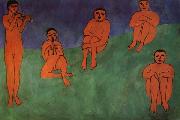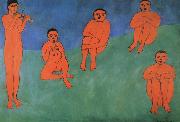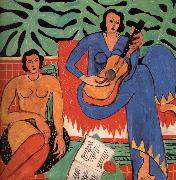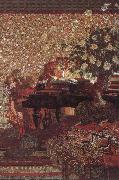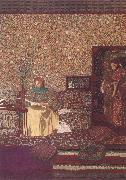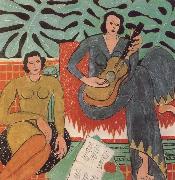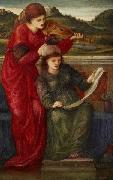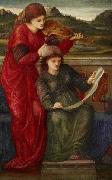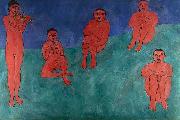Wholesale Oil Painting No Minimum |
|||||||||||
|
|
|||||||||||

|
|||||||||||
|
|
|
||||||||
Henri MatisseFrench Fauvist Painter and Sculptor, 1869-1954 Henri Matisse is considered the most important French artist of the 20th century and, along with Pablo Picasso, one of the most influential modernist painters of the last century. Matisse began studying drawing and painting in the 1890s. A student of the masters of Post-Impressionism, Matisse later made a reputation for himself as the leader of a group of painters known as Les Fauves. An ironic label given to them by a critic, the name reflected Matisse's aggressive strokes and bold use of primary colors. In 1905 Matisse gained sudden fame with three paintings, including Woman with the Hat, purchased by the wealthy American ex-patriot Gertrude Stein. Beyond painting, he worked with lithographs and sculpture, and during World War II he did a series of book designs. Later in his career he experimented with paper cutouts and designed decorations for the Dominican chapel in Vence, France. Along with Picasso, |
||||||||
|
|
||||||||
Music
Music Painting ID:: 29096 |
mk65
1910
Oil on canvas
102x153"
mk65 1910 Oil on canvas 102x153" |
|||||||
|
|
||||||||
Henri MatisseFrench Fauvist Painter and Sculptor, 1869-1954 Henri Matisse is considered the most important French artist of the 20th century and, along with Pablo Picasso, one of the most influential modernist painters of the last century. Matisse began studying drawing and painting in the 1890s. A student of the masters of Post-Impressionism, Matisse later made a reputation for himself as the leader of a group of painters known as Les Fauves. An ironic label given to them by a critic, the name reflected Matisse's aggressive strokes and bold use of primary colors. In 1905 Matisse gained sudden fame with three paintings, including Woman with the Hat, purchased by the wealthy American ex-patriot Gertrude Stein. Beyond painting, he worked with lithographs and sculpture, and during World War II he did a series of book designs. Later in his career he experimented with paper cutouts and designed decorations for the Dominican chapel in Vence, France. Along with Picasso, |
||||||||
|
|
||||||||
|
|
Music
Music Painting ID:: 57965 |
mk260 1909-1910 Oil on canvas in 260 x 389 cm mk260 1909-1910 Oil on canvas in 260 x 389 cm |
||||||
|
|
||||||||
Henri MatisseFrench Fauvist Painter and Sculptor, 1869-1954 Henri Matisse is considered the most important French artist of the 20th century and, along with Pablo Picasso, one of the most influential modernist painters of the last century. Matisse began studying drawing and painting in the 1890s. A student of the masters of Post-Impressionism, Matisse later made a reputation for himself as the leader of a group of painters known as Les Fauves. An ironic label given to them by a critic, the name reflected Matisse's aggressive strokes and bold use of primary colors. In 1905 Matisse gained sudden fame with three paintings, including Woman with the Hat, purchased by the wealthy American ex-patriot Gertrude Stein. Beyond painting, he worked with lithographs and sculpture, and during World War II he did a series of book designs. Later in his career he experimented with paper cutouts and designed decorations for the Dominican chapel in Vence, France. Along with Picasso, |
||||||||
|
|
||||||||
|
|
Music
Music Painting ID:: 58045 |
mk260 1939 Oil on canvas years 115.2 x 115.2 cm mk260 1939 Oil on canvas years 115.2 x 115.2 cm |
||||||
|
|
||||||||
Edouard Vuillard1868-1940 French Edouard Vuillard Galleries Jean-Edouard Vuillard, the son of a retired captain, spent his youth at Cuiseaux (Saone-et-Loire); in 1878 his family moved to Paris in modest circumstances. After his father\'s death, in 1884, Vuillard received a scholarship to continue his education. In the Lycee Condorcet Vuillard met Ker Xavier Roussel (also a future painter and Vuillard\'s future brother in law), Maurice Denis, musician Pierre Hermant, writer Pierre Veber and Lugne-Poe. On Roussel\'s advice he refused a military career and entered the Ecole des Beaux-Arts, where he met Pierre Bonnard. In 1885, Vuillard left the Lycee Condorcet and joined his closest friend Roussel at the studio of painter Diogene Maillart. There, Roussel and Vuillard received the rudiments of artistic training. |
||||||||
|
|
||||||||
|
|
Music
Music Painting ID:: 65950 |
mk288 1896 linen 212.5 x 154cm plastic painting Pompidou Museum in Paris mk288 1896 linen 212.5 x 154cm plastic painting Pompidou Museum in Paris |
||||||
|
|
||||||||
Edouard Vuillard1868-1940 French Edouard Vuillard Galleries Jean-Edouard Vuillard, the son of a retired captain, spent his youth at Cuiseaux (Saone-et-Loire); in 1878 his family moved to Paris in modest circumstances. After his father\'s death, in 1884, Vuillard received a scholarship to continue his education. In the Lycee Condorcet Vuillard met Ker Xavier Roussel (also a future painter and Vuillard\'s future brother in law), Maurice Denis, musician Pierre Hermant, writer Pierre Veber and Lugne-Poe. On Roussel\'s advice he refused a military career and entered the Ecole des Beaux-Arts, where he met Pierre Bonnard. In 1885, Vuillard left the Lycee Condorcet and joined his closest friend Roussel at the studio of painter Diogene Maillart. There, Roussel and Vuillard received the rudiments of artistic training. |
||||||||
|
|
||||||||
|
|
Music
Music Painting ID:: 65951 |
mk288 1896 linen 212.5 x 154cm plastic painting Pompidou Museum in Paris mk288 1896 linen 212.5 x 154cm plastic painting Pompidou Museum in Paris |
||||||
|
|
||||||||
Henri MatisseFrench Fauvist Painter and Sculptor, 1869-1954 Henri Matisse is considered the most important French artist of the 20th century and, along with Pablo Picasso, one of the most influential modernist painters of the last century. Matisse began studying drawing and painting in the 1890s. A student of the masters of Post-Impressionism, Matisse later made a reputation for himself as the leader of a group of painters known as Les Fauves. An ironic label given to them by a critic, the name reflected Matisse's aggressive strokes and bold use of primary colors. In 1905 Matisse gained sudden fame with three paintings, including Woman with the Hat, purchased by the wealthy American ex-patriot Gertrude Stein. Beyond painting, he worked with lithographs and sculpture, and during World War II he did a series of book designs. Later in his career he experimented with paper cutouts and designed decorations for the Dominican chapel in Vence, France. Along with Picasso, |
||||||||
|
|
||||||||
|
|
music
music Painting ID:: 66367 |
mk289 1939 oil on canvas albright knox art gallery buffalo mk289 1939 oil on canvas albright knox art gallery buffalo |
||||||
|
|
||||||||
Paolo Veronese1528-1588 Paolo Veronese Galleries Italian painter and draughtsman. With Titian and Tintoretto he makes up the triumvirate of great painters of the late Renaissance in Venice. He is known as a supreme colourist and for his illusionistic decorations in both fresco and oil. His large paintings of biblical feasts executed for the refectories of monasteries in Venice and Verona are especially celebrated. He also produced many altarpieces, history and mythological paintings and portraits. His compositional sketches in pen, ink and wash, figure studies in chalk, and chiaroscuro modelli and ricordi form a significant body of drawings. He headed a family workshop that remained active after his death. |
||||||||
|
|
||||||||
|
|
music
music Painting ID:: 69022 |
arithmetic music and philosophy honour venice, libreria. each 230cm in diameter
se arithmetic music and philosophy honour venice, libreria. each 230cm in diameter se |
||||||
|
|
||||||||
Thomas Dewing(May 4, 1851 C November 5, 1938) was an American painter working at the turn of the 20th century. He was born in Newton Lower Falls, Massachusetts. He studied at the Acad??mie Julian in Paris, and later settled into a studio in New York City. He married Maria Oakey Dewing, an accomplished painter with extensive formal art training and familial links with the art world. He is best known for his tonalist paintings, a sub-genre of American art that was rooted in English Aestheticism. Dewing's preferred vehicle of artistic expression is the female figure. Often seated playing instruments, writing letters, or engaged in other impassive actions and situated in gauzy, dreamy interiors, the figures remain remote and distant to the viewer. These scenes are infused with a color that pervades the entire picture, setting tone and mood. The ethereal delicacy and subtle color harmonies of Dewing's paintings have not met with universal approval: some feminist critics have lambasted Dewing's work as being misogynistic; he rarely painted anything other than the female figure, vacant of expression, languishing in sumptuous clothing. Tonalism quickly came to be considered outdated with the advent of modernism and abstraction in art, though Dewing was successful in his own day. His art was considered extremely elegant, and has undergone a subtle revival in the last 10 years or so. Dewing was a member of the Ten American Painters, a group of American Impressionists who seceded from the Society of American Artists in 1897. |
||||||||
|
|
||||||||
|
|
Music
Music Painting ID:: 71658 |
between 1896(1896) and 1900(1900)
Oil on canvas mounted on composition board and wooden panel
130.7 x 51.9 cm (51.46 x 20.43 in)
between 1896(1896) and 1900(1900) Oil on canvas mounted on composition board and wooden panel 130.7 x 51.9 cm (51.46 x 20.43 in) |
||||||
|
|
||||||||
Edward Burne-JonesBritish Pre-Raphaelite Painter, 1833-1898 English painter and decorative artist. He was the leading figure in the second phase of the Pre-Raphaelite movement. His paintings of subjects from medieval legend and Classical mythology and his designs for stained glass, tapestry and many other media played an important part in the Aesthetic Movement and the history of international Symbolism. |
||||||||
|
|
||||||||
|
|
Music
Music Painting ID:: 75751 |
Music, 1877 oil on canvas painting by Edward Burne-Jones, Ashmolean Museum.
cjr Music, 1877 oil on canvas painting by Edward Burne-Jones, Ashmolean Museum. cjr |
||||||
|
|
||||||||
Burne-Jones, Sir Edward ColeyBritish Pre-Raphaelite Painter, 1833-1898 English painter and decorative artist. He was the leading figure in the second phase of the Pre-Raphaelite movement. His paintings of subjects from medieval legend and Classical mythology and his designs for stained glass, tapestry and many other media played an important part in the Aesthetic Movement and the history of international Symbolism. |
||||||||
|
|
||||||||
|
|
Music
Music Painting ID:: 77519 |
1877 oil on canvas painting by Edward Burne-Jones, Ashmolean Museum
Date 1877(1877)
cyf 1877 oil on canvas painting by Edward Burne-Jones, Ashmolean Museum Date 1877(1877) cyf |
||||||
|
|
||||||||
Hans Baldung GrienGerman 1485-1545 Hans Baldung Grien Galleries The earliest pictures assigned to him by some are altar-pieces with the monogram H. B. interlaced, and the date of 1496, in the monastery chapel of Lichtenthal near Baden-Baden. Another early work is a portrait of the emperor Maximilian, drawn in 1501 on a leaf of a sketch-book now in the print-room at Karlsruhe. "The Martyrdom of St Sebastian and the Epiphany" (Berlin Museum), fruits of his labour in 1507, were painted for the market-church of Halle in Saxony. Baldung's prints, though D??reresque, are very individual in style, and often in subject. They show little direct Italian influence. His paintings are less important than his prints. He worked mainly in woodcut, although he made six engravings, one very fine. He joined in the fashion for chiaroscuro woodcuts, adding a tone block to a woodcut of 1510.[1] Most of his hundreds of woodcuts were commissioned for books, as was usual at the time; his "single-leaf" woodcuts (ie prints not for book illustration) are fewer than 100, though no two catalogues agree as to the exact number. He was extremely interested in witches and made many images of them in different media, including several very beautiful drawings finished with bodycolour, which are more erotic than his treatments in other techniques. Witch and Dragon. Drawing with bodycolour (b/w repro)Without absolute correctness as a draughtsman, his conception of human form is often very unpleasant, whilst a questionable taste is shown in ornament equally profuse and baroque. Nothing is more remarkable in his pictures than the pug-like shape of the faces, unless we except the coarseness of the extremities. No trace is apparent of any feeling for atmosphere or light and shade. Though Gr??n has been commonly called the Correggio of the north, his compositions are a curious medley of glaring and heterogeneous colours, in which pure black is contrasted with pale yellow, dirty grey, impure red and glowing green. Flesh is a mere glaze under which the features are indicated by lines. (1911) His works are mainly interesting because of the wild and fantastic strength which some of them display. His Eve, the Serpent and Death (National Museum of Canada) shows his strengths well. We may pass lightly over the "Epiphany" of 1507, the "Crucifixion" of 1512, or the "Stoning of Stephen" of 1522, in the Berlin Museum. There is some force in the "Dance of Death" of 1517, in the museum of Basel, or the Madonna of 1530, in the Liechtenstein Gallery at Vienna. Gr??n's best effort is the altarpiece of Freiburg, where the Coronation of the Virgin, and the Twelve Apostles, the Annunciation, Visitation, Nativity and Flight into Egypt, and the Crucifixion, with portraits of donors, are executed with some of that fanciful power which Martin Schongauer bequeathed to the Swabian school. As a portrait painter he is well known. He drew the likeness of Charles V, as well as that of Maximilian; and his bust of Margrave Philip in the Munich Gallery tells us that he was connected with the reigning family of Baden, as early as 1514. At a later period he had sittings from Margrave Christopher of Baden, Ottilia his wife, and all their children, and the picture containing these portraits is still in the grand-ducal gallery at Karlsruhe. Like D??rer and Cranach, Gr??n became a hearty supporter of the Reformation. He was present at the diet of Augsburg in 1518, and one of his woodcuts represents Luther under the protection of the Holy Ghost, which hovers over him in the shape of a dove. |
||||||||
|
|
||||||||
|
|
Music
Music Painting ID:: 87708 |
1529(1529)
Medium Oil on pine panel
cyf 1529(1529) Medium Oil on pine panel cyf |
||||||
|
|
||||||||
Henri MatisseFrench Fauvist Painter and Sculptor, 1869-1954 Henri Matisse is considered the most important French artist of the 20th century and, along with Pablo Picasso, one of the most influential modernist painters of the last century. Matisse began studying drawing and painting in the 1890s. A student of the masters of Post-Impressionism, Matisse later made a reputation for himself as the leader of a group of painters known as Les Fauves. An ironic label given to them by a critic, the name reflected Matisse's aggressive strokes and bold use of primary colors. In 1905 Matisse gained sudden fame with three paintings, including Woman with the Hat, purchased by the wealthy American ex-patriot Gertrude Stein. Beyond painting, he worked with lithographs and sculpture, and during World War II he did a series of book designs. Later in his career he experimented with paper cutouts and designed decorations for the Dominican chapel in Vence, France. Along with Picasso, |
||||||||
|
|
||||||||
|
|
Music
Music Painting ID:: 95210 |
1910
Type Oil on canvas
Dimensions 260 cm x 389 cm
cyf 1910 Type Oil on canvas Dimensions 260 cm x 389 cm cyf |
||||||
|
|
||||||||
|
Henri Matisse French Fauvist Painter and Sculptor, 1869-1954 Henri Matisse is considered the most important French artist of the 20th century and, along with Pablo Picasso, one of the most influential modernist painters of the last century. Matisse began studying drawing and painting in the 1890s. A student of the masters of Post-Impressionism, Matisse later made a reputation for himself as the leader of a group of painters known as Les Fauves. An ironic label given to them by a critic, the name reflected Matisse's aggressive strokes and bold use of primary colors. In 1905 Matisse gained sudden fame with three paintings, including Woman with the Hat, purchased by the wealthy American ex-patriot Gertrude Stein. Beyond painting, he worked with lithographs and sculpture, and during World War II he did a series of book designs. Later in his career he experimented with paper cutouts and designed decorations for the Dominican chapel in Vence, France. Along with Picasso, Music 1910 Type Oil on canvas Dimensions 260 cm x 389 cm cyf |
||||||||
|
|
||||||||
|
Prev Next
|
||||||||
|
|
||||||||
|
Related Paintings to Henri Matisse :. |
||||||||
|
|
||||||||
|
CONTACT US |
